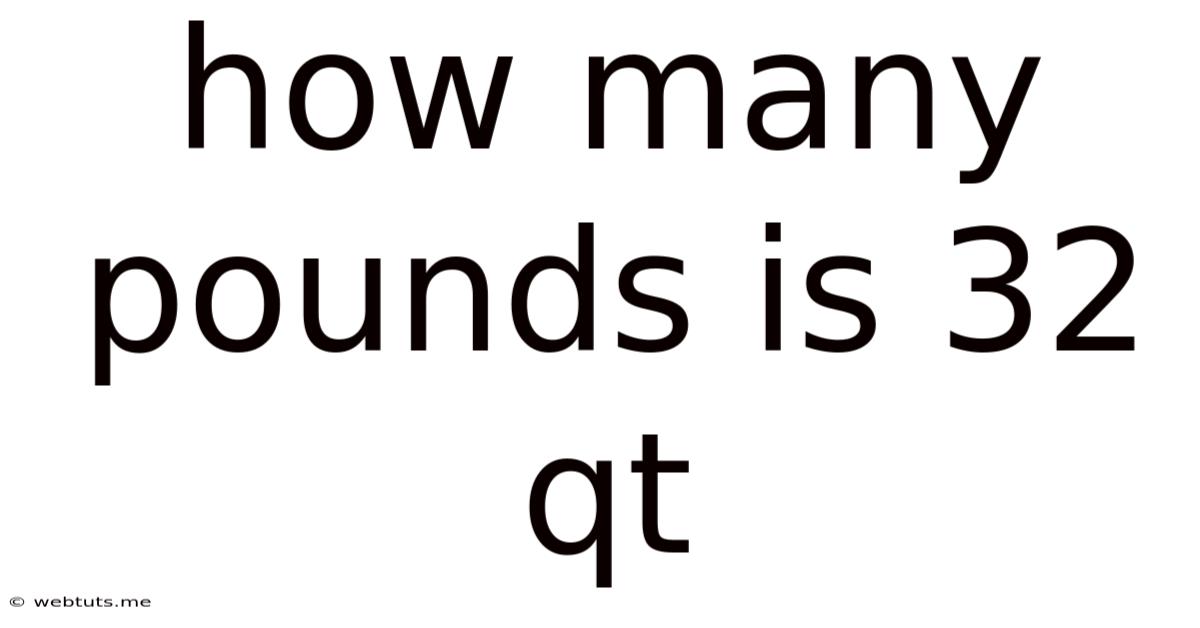How Many Pounds Is 32 Qt
Webtuts
May 10, 2025 · 4 min read

Table of Contents
How Many Pounds is 32 Quarts? Understanding Weight and Volume Conversions
The question "How many pounds is 32 quarts?" isn't straightforward. It's a classic example of needing to understand the crucial difference between weight (measured in pounds) and volume (measured in quarts). You can't directly convert quarts to pounds without knowing the density of the substance being measured. Density is the mass per unit volume; it tells us how tightly packed the matter is. Water, for instance, has a different density than oil, which has a different density than sand. This means 32 quarts of water will weigh a different amount than 32 quarts of oil.
Understanding the Fundamentals: Weight, Volume, and Density
Let's break down the key concepts:
-
Weight: Weight measures the force of gravity on an object. We usually measure weight in pounds (lbs), kilograms (kg), ounces (oz), etc.
-
Volume: Volume measures the amount of three-dimensional space occupied by an object or substance. Common units of volume include quarts (qt), gallons (gal), liters (L), cubic meters (m³), etc.
-
Density: Density is the mass of a substance per unit volume. It's typically expressed in units like grams per cubic centimeter (g/cm³), kilograms per liter (kg/L), or pounds per cubic foot (lb/ft³). A higher density means more mass is packed into the same volume.
The crucial relationship is: Weight = Volume × Density
Converting Quarts to Gallons and Liters
Before we delve into weight calculations, let's clarify some common volume conversions:
-
Quarts to Gallons: There are 4 quarts in 1 gallon. Therefore, 32 quarts is equal to 32 qt / 4 qt/gal = 8 gallons.
-
Quarts to Liters: 1 quart is approximately equal to 0.946 liters. Therefore, 32 quarts is approximately equal to 32 qt × 0.946 L/qt ≈ 30.27 liters.
Calculating Weight: The Importance of Density
Now, let's address the core question. To find out how many pounds are in 32 quarts, we need to know the density of the substance. Let's consider some examples:
Example 1: Water
The density of water is approximately 8.34 pounds per US gallon. Since we have 8 gallons (from our earlier conversion), the weight of 32 quarts of water would be:
8 gallons × 8.34 lb/gallon ≈ 66.72 pounds
This is a close approximation. The exact density of water can vary slightly depending on temperature and pressure.
Example 2: Milk
Milk has a slightly higher density than water, approximately 8.6 pounds per gallon. Therefore, 32 quarts (8 gallons) of milk would weigh approximately:
8 gallons × 8.6 lb/gallon = 68.8 pounds
Example 3: Oil
The density of oil varies considerably depending on the type of oil. Let's assume a density of approximately 7.5 pounds per gallon for a common type of cooking oil. Then, 32 quarts (8 gallons) of this oil would weigh approximately:
8 gallons × 7.5 lb/gallon = 60 pounds
Example 4: Gasoline
Gasoline has a density that is lower than water. It typically falls in the range of 6 to 6.5 pounds per gallon. Using an average density of 6.25 pounds per gallon:
8 gallons × 6.25 lb/gallon = 50 pounds
Beyond Liquids: The Challenge of Solids and Gases
The examples above focus on liquids, where volume measurement is relatively straightforward. Calculating the weight of solids or gases in quarts requires additional considerations:
-
Solids: Solids don't always fill a container completely. There might be air gaps between solid particles. To calculate weight accurately, you'd need to know the bulk density (the mass of the solid including the air gaps) or the particle density (the mass of the solid without air gaps), along with the volume the solid occupies within the 32 quarts.
-
Gases: Gases are compressible, meaning their density changes significantly with pressure and temperature. To calculate the weight of a gas in 32 quarts, you'd need to know the pressure and temperature, as well as the type of gas to determine its density under those conditions.
Practical Applications and Real-World Scenarios
Understanding weight-volume conversions is crucial in various real-world scenarios:
-
Cooking and Baking: Recipes often require specific amounts of ingredients, given in either weight or volume. Understanding the relationship between weight and volume allows you to accurately measure ingredients and achieve consistent results.
-
Shipping and Logistics: Shipping companies often charge based on the weight or volume of goods. Knowing both weight and volume helps determine shipping costs accurately.
-
Engineering and Construction: In engineering and construction, accurate calculations of weight and volume are critical for structural design and material estimations.
-
Chemical and Industrial Processes: In chemical and industrial processes, precise measurements of weight and volume are essential for controlling reactions, mixing materials and ensuring product quality.
Conclusion: Context is Key
The question "How many pounds is 32 quarts?" doesn't have a single answer. The weight depends entirely on the density of the substance. This highlights the importance of understanding the fundamental concepts of weight, volume, and density and the relationships between them. Always consider the specific substance when attempting a weight-volume conversion to ensure accurate results. Remember that these are approximations, and slight variations can occur based on factors such as temperature and pressure. Precise calculations require accessing specific density values for a given substance under its particular conditions.
Latest Posts
Latest Posts
-
8 Cups Is How Many Liters
May 10, 2025
-
30 Pints Is How Many Gallons
May 10, 2025
-
210 Kg Is How Many Pounds
May 10, 2025
-
How Many Days Till December 12 2024
May 10, 2025
-
How Many More Days Till Jan 1
May 10, 2025
Related Post
Thank you for visiting our website which covers about How Many Pounds Is 32 Qt . We hope the information provided has been useful to you. Feel free to contact us if you have any questions or need further assistance. See you next time and don't miss to bookmark.